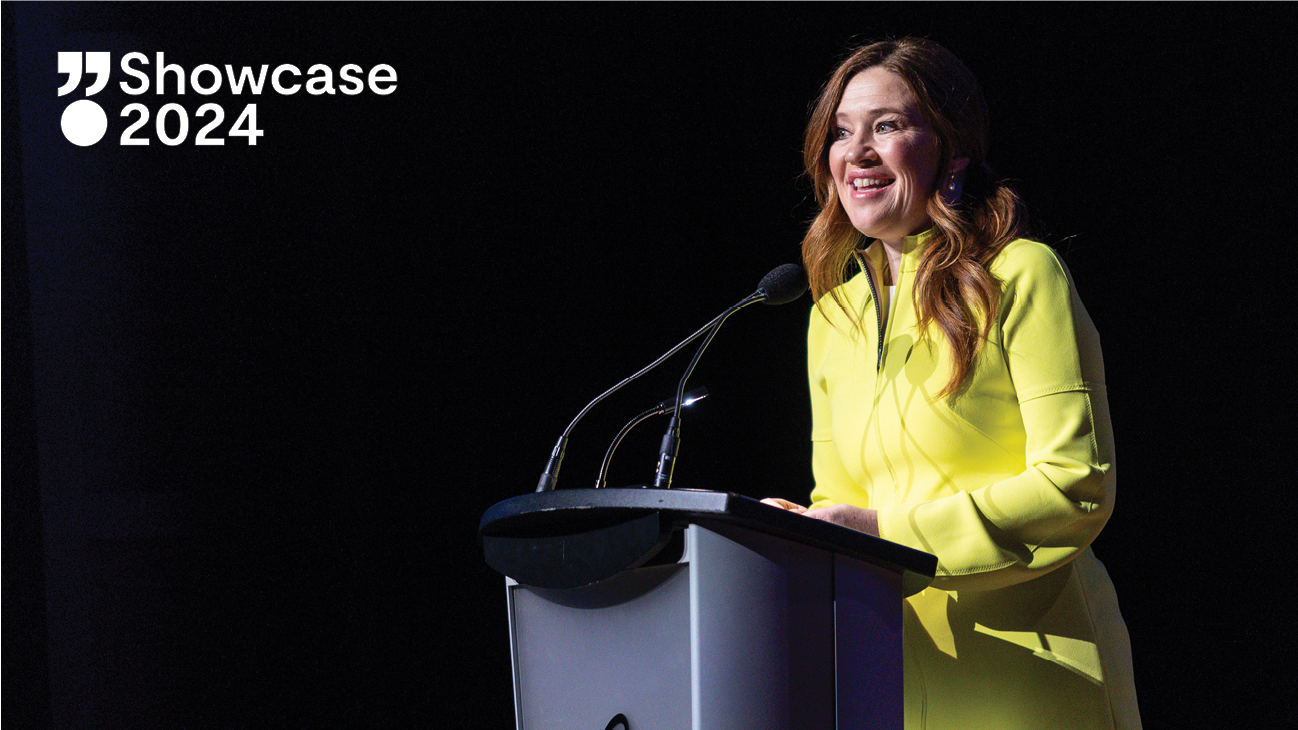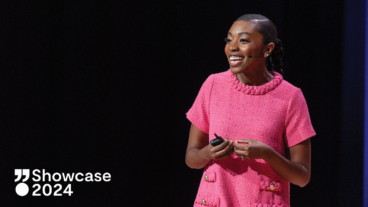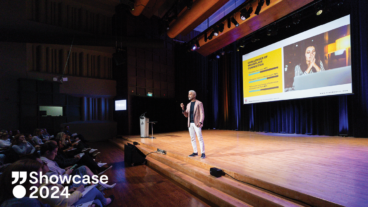Olympian Clara Hughes is one of Canada’s most influential and well-known mental health advocates. Through her advocacy journey, Clara has had the privilege of sharing her story and listening to the stories of others in return. From this she learned a powerful truth — everyone has the opportunity to help someone, and everyone has the capacity to heal.
A six-time Olympic medalist, Clara is the only athlete in Olympic history to win multiple medals in both summer and winter Games, representing Canada in both speed skating and cycling. Since retiring from sport in 2010, Clara has become one of our most committed humanitarians, candidly sharing her experience living with depression to help end the stigma around mental health and inspire others to become the champions they’re meant to be.
At Showcase 2024, Clara brought the audience on an emotional journey, sharing how she healed from a life of physical and mental pain to one where love and understanding can thrive.
“Wow! Powerful and engaging speakers. Great storytellers that captivated the audiences, with each providing helpful tips and best practices for participants to leverage.”
Showcase 2024 attendee
From “World-Class Delinquent” to World-Class Champion
I haven’t always been an Olympian, Clara said. “Before I was a world-class athlete, I was a world-class delinquent.” But she was just a scared kid. Clara grew up in a home that wasn’t safe. So, she used things like drugs, alcohol, and truancy to numb that pain. “The more trouble I got into, the more I put into my body, the less I felt the terrifying things I couldn’t understand,” Clara said.
That changed when she was 17. After watching a speed skating race in the winter Olympics, she had the “audacity” to believe she could do that, so she did. Sport got her back on track — on track to becoming the best in her province, nation, and ultimately the world. But not without its bumps.
At first, sport became just another addiction. Elements of training led to overtraining, Clara said, elements of nutrition led to starving myself; elements of everything expected of me as an athlete, I took to the highest degree. The more she won, the more people told her how good she was, how fast she was, how proud they were, she punished herself by not allowing herself to feel those things inside.
The 1996 Olympics were her first games, and she brought home two bronze medals. She thought they would change everything — that they would help her dad with his alcoholism, her sister who just tried to take her life, her mom who was numb.
It didn’t work, Clara said. This led to her first mental health crisis. The relentless pursuit of excellence in sport was put on hold in order to heal. It was a long journey back, but she was fortunate to have people that cared for her and that could guide her home.
A New Start: Learning to Be Present
Clara returned to sport two years later. She found a new coach who cared more about her as a human than any medal she could win. Her coach was determined to teach her how to listen to her body and not just use it as a machine.
In her first race back, she came in last place, but she is prouder of that race than the previous bronze-medal wins. “From that result, finishing what I started, not giving up on the possibility of doing something special, I experienced something so special,” Clara said. “I taught myself what is possible when I truly give myself to what I am doing. And most importantly, this coach encouraged me to take my first steps on my healing path. That healing path that continues to this day.”
This led her back to the ice, to an Olympic gold, silver, and bronze medal and to the ultimate Olympic opportunity — competing at home.
The Power of a Beginners Mind
At 37 years old, Clara competed in her last Olympics — the 2010 Vancouver Games, where she was also the flag bearer. As she matured in sport, she had to find ways to connect back to that beginner’s mind, of being open and eager with a lack of preconceptions. She found it with the help of the four host First Nations: the Squamish, Musqueam, Tsleil-Waututh, and Lil’wat.
Ahead of the Games, Clara spent time with the kids of these four First Nations, skating and playing games with them on the very ice she would compete on. This brought her back to possibility, to finding fun and joy in sport, she said.
Dennis Joseph, the leader of the Squamish Nation, shared an important lesson with Clara. He said that as a competitor, she could only want goodness and greatness and success for herself if she wanted it for every single person around her. Every person, he continued, only then can you ask it for yourself.
Clara went on to win a bronze medal in the last race of her Olympic career — a win that was as good as gold, she said. She announced her retirement from sport shortly after and went on to accept what she called the most important opportunity of her life. Clara became the first spokesperson for Bell Let’s Talk, kickstarting a national conversation about mental health.
“The lessons and the great gift of this all has been learning how to listen,” Clara said. “Learning how to hold space for somebody who may be sharing their truth for the very first time in their life. Learning how to hold that space so they can be seen, heard, and believed for maybe the first time in their life.” We all have the opportunity to help someone, she concluded, and we all have the capacity to heal.
Hire Clara Hughes to Speak at Your Event
Told with honesty and passion, Clara’s revelatory and inspiring story touches the hearts of all who hear it. She takes audiences through a wide-ranging journey of self-discovery to help them learn how to listen so they can heal, disconnect so they can reconnect, let go of the fear of failing, and learn to truly feel.
Contact us to learn more about Clara Hughes and to book her for your next event.




